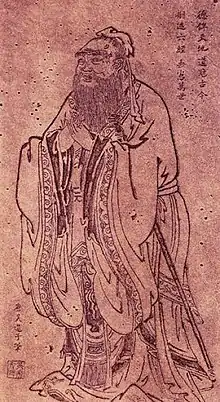Role ethics
Role ethics is an ethical theory based on family roles.[1] Unlike virtue ethics, role ethics is not individualistic. Morality is derived from a person's relationship with their community.[2] The ethics of Confucianism is an example of role ethics.[1]
Confucianism

Confucian role ethics centers around filial piety or xiao, a respect for family members.[3] The concept is elaborated in the Confucian text Classic of Filial Piety: "In serving his parents, a filial son reveres them in daily life; he makes them happy while he nourishes them; he takes anxious care of them in sickness; he shows great sorrow over their death; and he sacrifices to them with solemnity."[4] Filial duty requires the desire to be filial, and not just the act of filial piety.[2] In Confucian societies, filial piety determines the "moral worth" of an individual in a community and acts as a form of social capital.[4]
According to Roger T. Ames and Henry Rosemont, "Confucian normativity is defined by living one's family roles to maximum effect." In Confucian role ethics, morality is based on a person's fulfillment of a role, such as that of a parent or a child. These roles are established as relationships, and are not individualistic. Confucian roles are not rational, and originate through the xin, or human emotions.[2]
The concept of li or ritual propriety is crucial to Confucian roles. Propriety reinforces family relationships, and binds together the community. The performance of li expresses a person's moral commitment as a human being.[2]
In Japan, modern Confucian scholars like Uno Tetsuto and Ichimura Sanjiro have attempted to mix Confucian role ethics with concepts such as democracy and human rights.[5]
Stoicism
Epictetus developed and introduced role ethics into Stoicism, an approach to ethics based on taking seriously the different roles we all play in life. The roles are:
- the general role of a human being in society (the human cosmopolis) at large;
- roles that we choose for ourselves, being a father, or friend;
- roles that the circumstances assign to us, being a son or daughter.
Epictetus’s role ethics was a development of a similar concept developed by Panaetius who was a philosopher of the middle Stoa. [6]
References
- Roger T. Ames (30 April 2011). Confucian Role Ethics: A Vocabulary. University of Hawaiʻi Press. ISBN 978-0-8248-3576-7.
- Chris Fraser; Dan Robins; Timothy O'Leary (1 May 2011). Ethics in Early China: An Anthology. Hong Kong University Press. pp. 17–35. ISBN 978-988-8028-93-1.
- Wonsuk Chang; Leah Kalmanson (8 November 2010). Confucianism in Context: Classic Philosophy and Contemporary Issues, East Asia and Beyond. SUNY Press. p. 68. ISBN 978-1-4384-3191-8.
- Edited by Charlotte Ikels (2004). Filial Piety: Practice and Discourse in Contemporary East Asia. Stanford University Press. pp. 3–5. ISBN 978-0-8047-4791-2. Retrieved 21 November 2012.CS1 maint: extra text: authors list (link)
- Oliver Leaman (2001). Encyclopedia of Asian Philosophy. Taylor & Francis. p. 191. ISBN 978-0-415-17281-3.
- Pigliucci, Massimo (2020). The Stoic Guide to a Happy Life.
